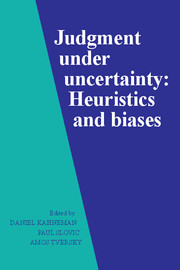Book contents
- Frontmatter
- Contents
- List of contributors
- Preface
- Part I Introduction
- Part II Representativeness
- Part III Causality and attribution
- Part IV Availability
- Part V Covariation and control
- Part VI Overconfidence
- 20 Overconfidence in case-study judgments
- 21 A progress report on the training of probability assessors
- 22 Calibration of probabilities: The state of the art to 1980
- 23 For those condemned to study the past: Heuristics and biases in hindsight
- Part VII Multistage evaluation
- Part VIII Corrective procedures
- Part IX Risk perception
- Part X Postscript
- References
- Index
23 - For those condemned to study the past: Heuristics and biases in hindsight
Published online by Cambridge University Press: 05 May 2013
- Frontmatter
- Contents
- List of contributors
- Preface
- Part I Introduction
- Part II Representativeness
- Part III Causality and attribution
- Part IV Availability
- Part V Covariation and control
- Part VI Overconfidence
- 20 Overconfidence in case-study judgments
- 21 A progress report on the training of probability assessors
- 22 Calibration of probabilities: The state of the art to 1980
- 23 For those condemned to study the past: Heuristics and biases in hindsight
- Part VII Multistage evaluation
- Part VIII Corrective procedures
- Part IX Risk perception
- Part X Postscript
- References
- Index
Summary
Benson (1972) has identified four reasons for studying the past: to entertain, to create a group (or national) identity, to reveal the extent of human possibility, and to develop systematic knowledge about our world, knowledge that may eventually improve our ability to predict and control. On a conscious level, at least, we behavioral scientists restrict ourselves to the last motive. In its pursuit, we do case studies, program evaluations, and literature reviews. We even conduct experiments, creating artificial histories upon which we can perform our postmortems.
Three basic questions seem to arise in our retrospections: (a) Are there patterns upon which we can capitalize so as to make ourselves wiser in the future? (b) Are there instances of folly in which we can identify mistakes to avoid? (c) Are we really condemned to repeat the past if we do not study it? That is, do we really learn anything by looking backward?
Whatever the question we are asking, it is generally assumed that the past will readily reveal the answers it holds. Of hindsight and foresight, the latter appears as the troublesome perspective. One can explain and understand any old event if an appropriate effort is applied. Prediction, however, is acknowledged to be rather more tricky. The present essay investigates this presumption by taking a closer look at some archetypal attempts to tap the past.
- Type
- Chapter
- Information
- Judgment under UncertaintyHeuristics and Biases, pp. 335 - 352Publisher: Cambridge University PressPrint publication year: 1982
- 128
- Cited by



